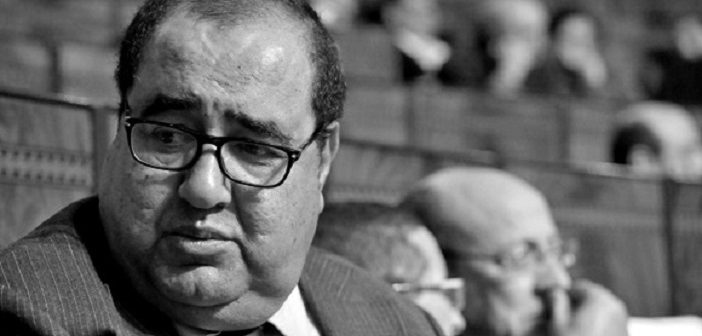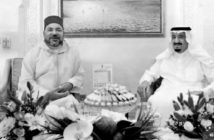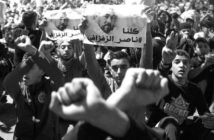While the effects of the Arab Spring events have undeniably proven an unprecedented popular dynamism, which disproves the long maintained claim that Arab masses are lacking in political awareness, they have also disclosed the bankruptcy of political parties, which are supposed to adopt and channel the path and the outcomes of the revolution. It is generally true that political parties, leftist or otherwise, have not played any significant role in instigating the mass protests, yet leftist parties are singled out with much criticism because of their betrayal and disloyalty to the principles of the revolution they used to advocate.
Like the majority of Arab countries, Morocco’s left has participated in the official politics, and worked to legitimize its operation by the deceptive claim that change’s avenue is only possible through reform from within. While this pretense secured a favorable foothold for the USFP (Socialist Union of Popular Forces) in the decision-making process, and backed up the regime against any political instability, the party’s political discourse and popular basis have become increasingly unreliable and waning given the amount of ideological and intellectual concessions the party made to guarantee the success of the ‘Alternance government’.
Irrespective of the circumstances and motivations that were behind heading the USFP for the cabinet, the party seemed to squander the opportunity to reconcile with the grassroots and rectify the flaws of its governmental operation. In other words, the party was supposed to return to the opposition ranks after the king Mohamed VI had nominated the technocratic Driss Jettou as Prime Minister instead of the secretary general of the USFP, who has led his party to secure the first place in the elections with fifty seats. Following the elections, the party has been fragmented between those who preferred to participate anyhow in the government, and those who have been disappointed, and decided to withdraw , such as Abderrahman al-Youssoufi who considered that the “alternance experience that Morocco knew in the last five years is nothing but a repetition of past experiences.”
In spite the fact that his statement is a clear denunciation of the way his party has been instrumentalised by the regime, it is also a frank call for the party’s constituents to reconsider how to rehabilitate the internal house that has been inconsistent and unable to deliver the promises it has once committed itself for. Al-Youssoufi’s disappointment is not only about his inability to materialize the hopes he considered possible through the consensual government of alternance, but also about his failure to persuade the elites of the socialist party to reconcile with their founding principles and return to the opposition ranks. Thus, his resignation in 2003 from leading the party and from the political life in general is a lesson that proves that without self-criticism and being true to its former self, the Moroccan left will never retain its identity and speak for social justice and democracy.
Maybe the thoughtful and long-sighted lesson of al-Youssoufi did not receive due consideration from leftist circles at that time because of their struggle over government, but the winds of the ‘Arab Spring’ have caught them off guard, and revealed that the segments of society they neglected and failed to defend are now taking their own fate into their hands. The spontaneous uprisings that broke out in Morocco faced Moroccan political parties in general and leftists in particular with their impotence, and forcefully necessitated a reconsideration of the way the splintered elements of the left manage their ideological, political and organizational visions. Measures to stay relevant in the political scene have become more stressing after the Islamists of the PJD (Justice and Development Party) grasped the opportunity, and presented themselves as a political alternative for the unpromising Moroccan party politics.
To reclaim their glorious past and meet the challenges of the post-Arab Spring era, the components of the left have considered the indispensability of unity and confederation as a solution for their intellectual and political impasse. Despite the fact that the challenges of this unity loom ahead, the United Socialist Party (PSU), the Democratic Socialist Vanguard Party (PADS), and the National Ittihadi Congress (CNI) announced their unity under the Democratic Left Federation (DLF). Many speculations have accompanied this initiative, and even doubted its outcomes because it was motivated by sudden popular upheavals that did not allow much time for these dispersed parties to reconsider their strategic choices and develop theoretical conceptions for their common ground cooperation.
Thus, the decision of the federation to break free from their principled boycott of the elections and entertain the idea that reform is possible from within the institutions of the state, amount to their pragmatic understanding of the requirements of the post-Arab spring era. Pondering over the nuances of this initiative reveals that the left’s approach is both defensive and preventive, in the sense that it meant only to stop the progress of the Islamists by taking part in the elections they used to describe as rigged and controlled. The leftists are supposed to benefit from the popular demonstrations organized under the 20th of February movement because of the socialist-like demands that have been raised like social justice, and parliamentarian monarchy, but to their surprise, the moderate Islamists of the PJD politically led the mass protests and got the harvested the fruit instead.
It is true that the three parties of the confederation deserve much respect for their courage to manage some of their disagreements, but their engagement with the demands of the street seems to be misplaced. The Democratic Left Federation (DLF) miscalculated its participation in the elections when it decided to challenge a well-organized and a well-based political party like the PJD.
If the ‘Arab Spring’ events woke them up to the fact that their weight is decreasing among Moroccans, their endeavor should be logically about how to convince the grassroots and how to regain their trust. On the contrary, the confederation operated vertically just with the state, and missed that the source of its legitimacy can be secured only by a horizontal policy, which aims at strengthening its popular basis. Reconnecting with the citizens through elections and constitutional participation is not a valid choice for the Democratic Left Federation (DLF) because the union is still mired in organizational problems and its success in the elections depends on its ability to secure a substantial social support, which is not indeed an outcome of an overnight endeavor. Therefore, regardless of the spirit that DLF ties to spread in the leftist body, the outcomes of its political operations are not likely to be seen in the near future, because its architects did not prioritize internal problems before getting into the elections and their logics.
The discourse of the Moroccan left has certainly undergone ups and downs, following the rise and fall of particular ideas that necessitate compatible measures to remain relevant.
Definitely, the popular protests of 2011 have pushed the diverse elements of the left into trying new strategies to recover from their disclosed weakness, but their capacity to produce the desired effects remains uncertain. Thus, testing the validity of these choices is contingent upon their consistency with the trajectory and the general orientation of the spirit of the leftist ideology.




